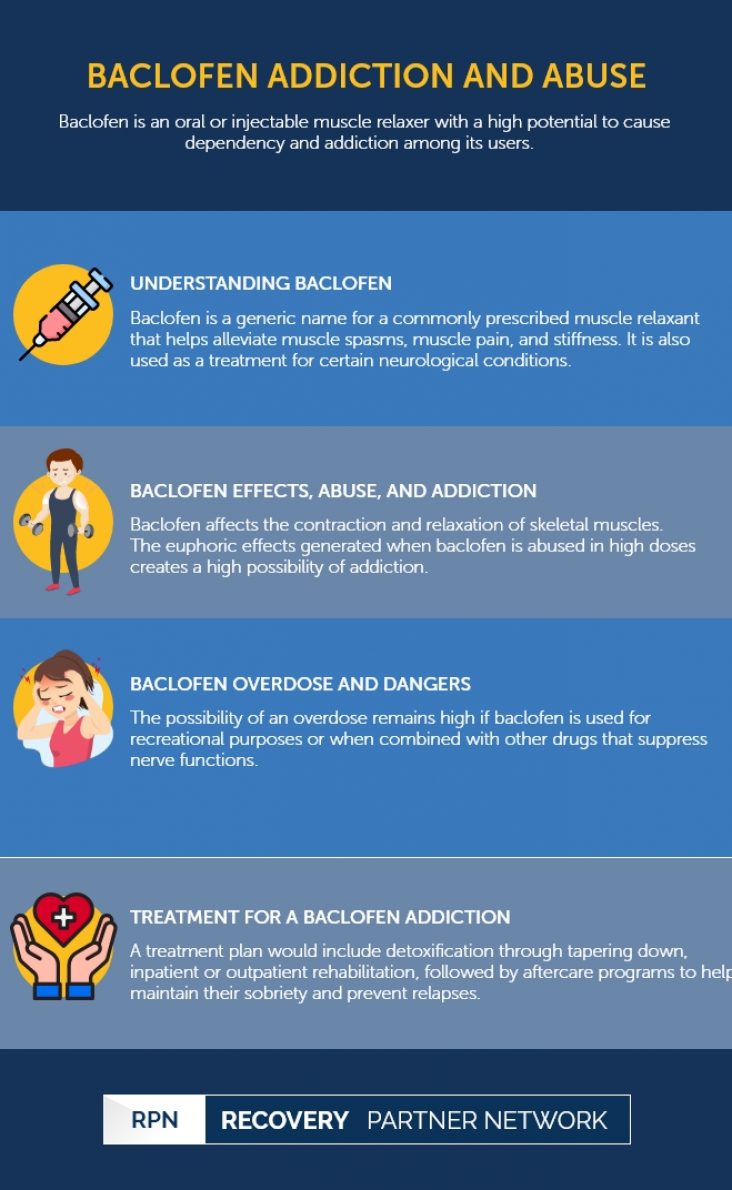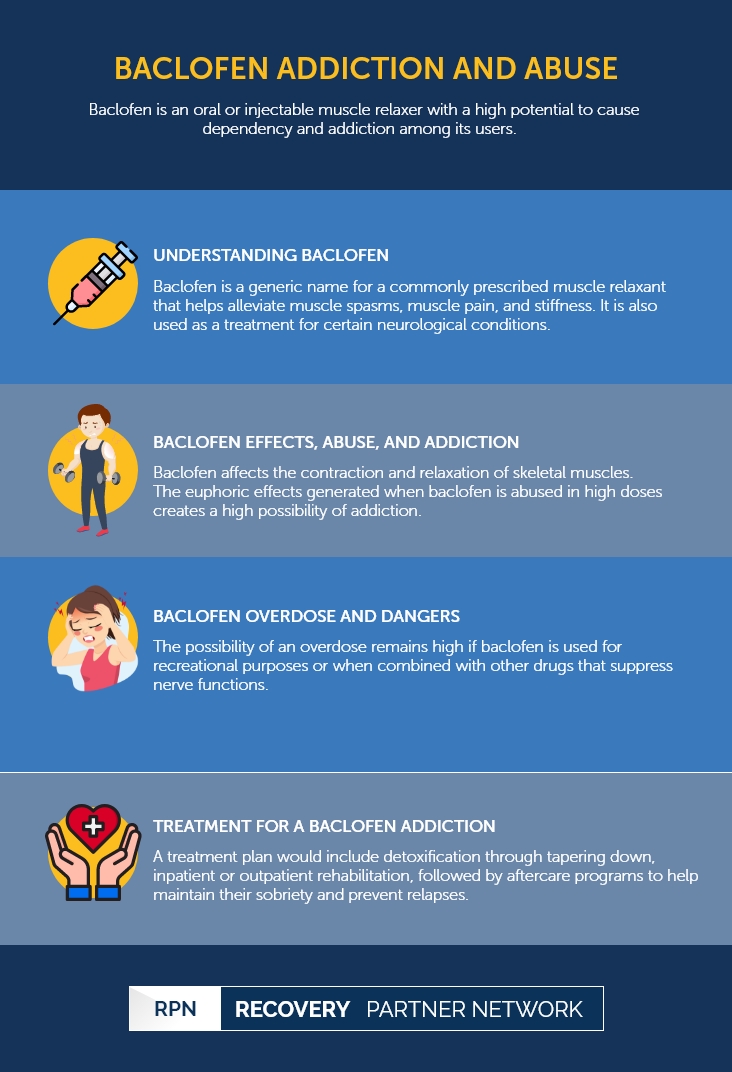Baclofen is an oral or injectable muscle relaxer with a high potential to cause dependency and addiction among its users.
Baclofen Addiction and Abuse
Illicit drugs
- Ayahuasca addiction – Abuse
- Baclofen addiction
- Black tar heroin addiction
- Cannabis addiction
- Cocaine dependence
- Crack cocaine addiction
- DMT addiction abuse treatment
- Does Marijuana Kill Brain Cells?
- Ecstasy addiction
- Gabapentin addiction
- gamma-Hydroxybutyric acid addiction
- Hallucinogen
- Heroin addiction
- Illicit drug addiction
- Inhalant addiction
- Cocaine
- Ketamine addiction
- Lysergic acid diethylamide addiction
- Mescaline addiction
- Methamphetamine addiction
- Meth Labs: Cooking up Addiction
- Meth Mouth
- Microdosing
- Phencyclidine addiction
- Psilocybin mushroom addiction
- Sage of the diviners – Addiction
- Shooting Heroin
- Shooting Methamphetamine
- Smoking Cannabis
- Speedball
- Synthetic cannabinoids
Baclofen addiction | Table of Contents
Understanding Baclofen
Baclofen is the generic name for a commonly prescribed muscle relaxant that helps alleviate muscle spasms, muscle pain, and stiffness. Baclofen is also known by its brand names Gablofen and Lioresal. Some neurological conditions, such as multiple sclerosis and cerebral palsy, as well as symptoms associated with spinal cord disease/injury, are also treated with this medication. Baclofen is an oral or injectable medication. Though it is considered an off-label use, baclofen is also being used as a treatment for substance use disorders.
FAQ
Baclofen is used in treating certain forms of spasticity (muscle tension and tightness) caused by multiple sclerosis, spinal injuries, or other spinal cord related conditions.
In New York, 10 mg of baclofen would cost around $0.92 per pill when obtained illegally. While in other states, the price may be as high as $2 per pill.
Baclofen is far more effective than Flexeril and has fewer side effects.
Baclofen Effects, Abuse, and Addiction
This medication functions by blocking the nerve cell signals in the brain that controls the contraction and relaxation of skeletal muscles. Consumption of baclofen over the prescribed dosage or for longer than prescribed is considered abuse. Combining the drug with other opiate painkillers, illicit drugs, benzos, and alcohol is also considered highly dangerous and abusive. Most who abuse baclofen combine the drug with other substances to produce euphoria, a high similar to that of marijuana or alcohol.
Some of the side effects of baclofen abuse:
- Drowsiness
- Dizziness
- Fatigue
- Headache
- Insomnia
- Nausea
Some of the more severe side effects of baclofen abuse are:
- Trouble urinating
- Agitation
- Hallucinations
- Seizures
The severe side effects of baclofen consumption can cause fatal consequences. Although baclofen is not considered to be addictive when consumed under a strict prescription, the euphoric effects generated when abused make baclofen a highly addictive substance. Prolonged use of baclofen can lead to the development of tolerance and dependence on the drug.
Since this drug is generally prescribed for patients suffering from severe chronic pain, the potential for abuse and addiction is highly increased. The use of this drug in addiction treatment also increases the chances of addiction as they are being prescribed for patients who are already susceptible to form an addiction.
Signs of baclofen dependence and addiction are:
- Unable to refrain from Baclofen consumption.
- Requiring higher doses due to the build-up of tolerance.
- Experiencing withdrawal symptoms when quitting the drug.
FAQ
- How strong is baclofen?
- Is baclofen a pain killer?
- Can baclofen make you sleepy?
- Does baclofen help with anxiety?
- Can baclofen make you gain weight?
There are 10 mg and 20 mg dosage pills available in the pharmacies. The normal starting dose of oral baclofen for the care of spasticity in adults is 5 mg given thrice daily. Depending on the response, the dosage can be increased by 5 mg per three days to a maximum of 80 mg/day in separate doses.
Baclofen is used as a skeletal muscle relaxant to help manage pain.
This drug may cause sleepiness. It is advised to refrain from consuming alcohol or taking any other drug while on baclofen, as it may make you more drowsy.
In addition to muscle relaxation, baclofen tends to have an anxiolytic effect that decreases anxiety.
Weight gain is a rare side effect of baclofen. Such side effects may fade away during treatment as the body adapts to the drug. A health care professional may also be able to tell you how to avoid or minimize some of these side effects.
Baclofen Overdose and Dangers
There are high chances of baclofen overdose, especially when used for recreational purposes or consumed along with drugs that also depresses nerve functions.
Warning signs of baclofen overdose include:
- Vertigo
- Trouble breathing
- Loss of consciousness
- Low body temperature
- Lightheadedness
- Muscle weakness
- Vomiting
- Drowsiness
- Dilated or pinpointed pupils
- Weak or shallow breathing
Severe effects of baclofen overdose include:
- Seizures
- Hypothermia
- A dangerously slow heart rate/bradycardia
- Coma
- Death
FAQ
Taking excessive amounts of baclofen or mixing it with other drugs can generate a feeling of euphoria.
Baclofen can be administered orally with or without food as per the directions given by your doctor, typically three times a day. To minimize side effects, your doctor may start you off at a low dose and increase the dosage gradually.
Baclofen's Potential in Addiction Treatment
Baclofen Addiction is an epidemic that impacts individuals of all ages. The National Institute on Drug Abuse (NIDA) recorded a 2.5-fold rise in overall drug fatalities over the years 2001 to 2013. Among the large fatalities recorded, a large number of them are directly contributed by prescription pain relievers.
Baclofen was initially conceived as a medication for the diagnosis of epilepsy. GABA Receptor Pharmacology states that since being first synthesized in 1962, the medication was only minimally active in the management of epilepsy, but was commonly used to alleviate spasticity related to several diseases. In 2009, Olivier Ameisen, a cardiologist, wrote a book describing his rehabilitation from baclofen dependence, which contributed to additional inquiries into the medication’s effectiveness as a cure for addiction. Although baclofen’s usage in the treatment of opioid dependence and alcohol withdrawal syndrome is still deemed controversial, it is steadily gaining popularity, and clinical studies continue to investigate the potential for its application.
FAQ
- How long does it take for baclofen to kick in?
- What are the side effects of baclofen 10 mg?
- How much baclofen can you take in a day?
The baclofen pill typically starts to work about thirty minutes after taking it, but it can vary from person to person.
Side effects may include sleepiness, dizziness, fatigue, exhaustion, headache, sleep problems, nausea, frequent urination, or bowel problems.
The recommended dosage is 60 – 120 mg per day divided into three doses each day. However, the dose may change based on how it works for you and your drug tolerance. The basic starting dose is 10 mg per night.
Baclofen Withdrawal
The development of tolerance and dependence on baclofen can be formed within a short period. Abrupt cessation of baclofen consumption can lead to adverse and intense withdrawal symptoms. Therefore patients are highly advised to seek medical and professional help when wishing to quit drug use.
Some baclofen withdrawal symptoms may include:
- Rebound spasticity
- Itching
- Low blood pressure
- Lightheadedness
- Tingling sensations
When left untreated, early symptoms of withdrawal can lead to more serious and uncomfortable symptoms.
More severe baclofen withdrawal symptoms include:
- High fever
- Change of mental status
- Muscle stiffness
- Loss of function in many vital organs
- Death
- Seizures
- Hallucinations
Treatment for a Baclofen Addiction
Medical detox is generally the first step in treating any form of substance use disorder. The tapering down method is the ideal form of detoxification for baclofen. During this period, doctors gradually reduce the dose of baclofen over a certain period. This process will also address any polydrug abuse a patient may have. After the completion of detoxification, patients will receive further treatment at an inpatient or outpatient treatment center.
Patients diagnosed with a severe form of addiction will be recommended to attend an inpatient rehabilitation program. This program provides patients with around the clock medical supervision and medication. Inpatient rehab programs may include individual therapy, group counseling and family therapy.
Outpatient treatment is more suitable for individuals who are diagnosed with a mild form of addiction. This program provides patients the flexibility to return to their daily lives after receiving the treatment they require. Outpatient treatment is an ideal choice for patients with unavoidable responsibilities and obligations at home, work, or school. This program provides patients access to counselors, support groups, and essential education in relapse prevention. Outpatient treatment programs are also highly recommended for patients who complete inpatient treatment as it helps them gradually integrate back into society.
Prolonged recovery requires life long treatment, as addiction is a life long disease. Hence, patients who complete inpatient or outpatient rehabilitation must seek aftercare programs to help maintain their sobriety. Aftercare programs help patients navigate through cravings and triggers so they could be better prepared for the world outside. Aftercare treatment may include individual therapy and support groups. Support groups have proven to be an effective method for relapse prevention as it provides patients a safe space and a sense of community among their peers.
Recovery Partner Network
We aim to educate and empower. If you feel our library of resources does not cover your specific need, reach out to us, and we would be happy to help.
STATISTICS
© Copyright 2024


